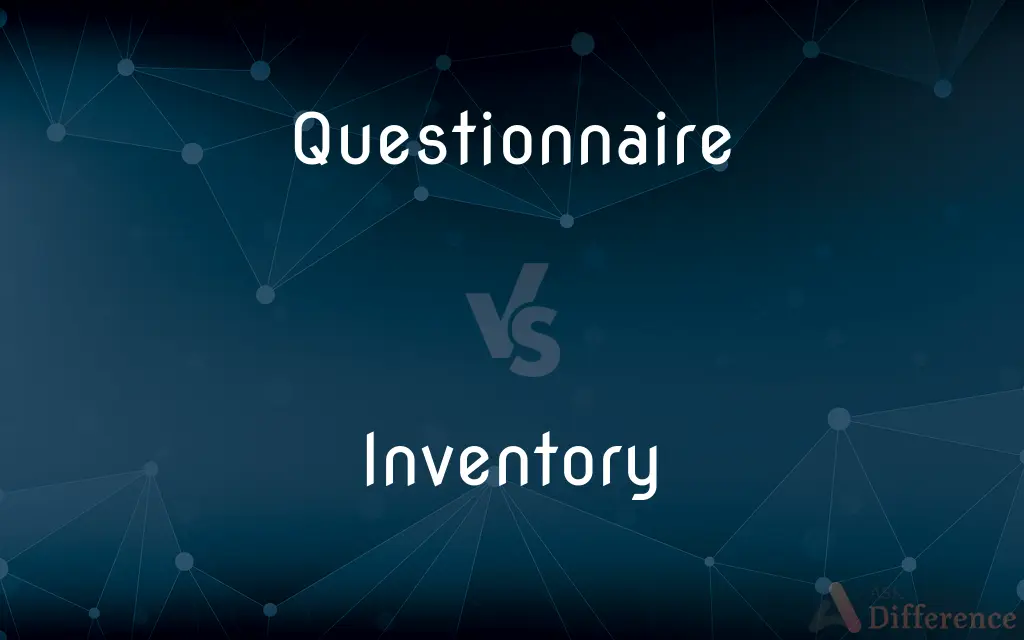Questionnaire vs. Inventory — What's the Difference?
By Maham Liaqat & Fiza Rafique — Updated on March 19, 2024
A questionnaire is a set of structured questions used for research or assessment, focusing on gathering specific information. An inventory refers to a comprehensive list or catalog, often of items or resources, and denote psychological assessment tool.

Difference Between Questionnaire and Inventory
Table of Contents
ADVERTISEMENT
Key Differences
Questionnaires are designed with a series of questions intended to gather information, opinions, or feedback from respondents. They are widely used in surveys, research, and various fields to collect data that can be analyzed for insights. In contrast, an inventory in the general sense is a detailed list of items, such as products in a warehouse or assets in an organization, used for management and tracking purposes. In psychology, an inventory refers to a type of assessment tool that evaluates certain aspects of a person's characteristics, behaviors, or conditions, often through a series of statements or questions to which individuals respond.
While a questionnaire is primarily a data collection tool focusing on specific questions related to a topic, an inventory, especially in a non-psychological context, serves as a record-keeping tool for resources or items. Psychological inventories, however, share similarities with questionnaires in that they both use questions or statements to gather responses but differ in their objectives.
The design and application of questionnaires are guided by the objectives of the research or assessment, with questions crafted to elicit clear, relevant, and measurable responses. Inventories, particularly in the context of asset management, are structured to provide a comprehensive overview of resources, requiring details like descriptions, quantities, and conditions of items. Psychological inventories are carefully developed to ensure reliability and validity in measuring the constructs of interest, often based on theoretical frameworks.
In terms of usage, questionnaires are a versatile tool applied across various domains, from market research to academic studies, where the primary goal is to gather specific information from a targeted group. Inventories are essential in operational and logistical planning, helping organizations manage assets effectively. In psychology, inventories serve as a diagnostic and assessment tool, contributing valuable insights into individual differences and aiding in treatment planning.
Questionnaires and inventories, while distinct in their primary functions and contexts, both play crucial roles in information gathering and assessment. Questionnaires are key in extracting targeted information for analysis, whereas inventories are fundamental in cataloging and managing resources or, in psychological settings, in assessing individual traits and behaviors.
ADVERTISEMENT
Comparison Chart
Primary Purpose
To collect information, opinions, or feedback.
To list and manage items or resources.
Structure
Series of structured questions.
Detailed list of items with descriptions, quantities, conditions.
Usage Contexts
Research, surveys, assessments in various fields.
Resource management, asset tracking.
Types of Responses
Open-ended or closed-ended answers.
Itemized entries with specific details.
Objective
To gather specific data for analysis.
To catalog and keep track of resources.
Compare with Definitions
Questionnaire
A set of questions for gathering information.
The researcher used a questionnaire to collect data on consumer preferences.
Inventory
A detailed list of items, usually for management purposes.
The warehouse manager updated the inventory at the end of each month.
Questionnaire
Can be used in various formats, including online surveys.
Participants completed the online questionnaire within 15 minutes.
Inventory
Can refer to various contexts, from retail to personal assets.
She kept a personal inventory of her book collection.
Questionnaire
Can be anonymous to protect respondents' privacy.
Respondents were assured their answers on the questionnaire would remain anonymous.
Inventory
May use software or systems for tracking and control.
The company invested in an inventory management system to streamline operations.
Questionnaire
Designed to be clear and unbiased to ensure reliable responses.
The questionnaire was carefully worded to avoid leading questions.
Inventory
An assessment tool measuring psychological traits or states.
The Beck Depression Inventory is widely used to assess the severity of depression.
Questionnaire
Often includes both qualitative and quantitative questions.
The questionnaire mixed multiple-choice questions with open-ended prompts.
Inventory
Helps in diagnosing mental health conditions or understanding personality.
The inventory results contributed to the patient's treatment plan.
Questionnaire
A questionnaire is a research instrument consisting of a series of questions (or other types of prompts) for the purpose of gathering information from respondents. The questionnaire was invented by the Statistical Society of London in 1838.Although questionnaires are often designed for statistical analysis of the responses, this is not always the case.
Inventory
Consists of statements that respondents rate or agree with.
In the inventory, individuals rated how often they experienced certain feelings.
Questionnaire
A form containing a set of questions, especially one addressed to a statistically significant number of subjects as a way of gathering information for a survey.
Inventory
Inventory (American English) or stock (British English) refers to the goods and materials that a business holds for the ultimate goal of resale, production or utilisation.Inventory management is a discipline primarily about specifying the shape and placement of stocked goods. It is required at different locations within a facility or within many locations of a supply network to precede the regular and planned course of production and stock of materials.
Questionnaire
A form containing a list of questions; a means of gathering information for a survey
Carry out a questionnaire
Fill out a questionnaire
Inventory
A detailed, itemized list, report, or record of things in one's possession, especially a periodic survey of all goods and materials in stock.
Questionnaire
To survey using questionnaires
Inventory
The process of making such a list, report, or record.
Questionnaire
Same as Questionary.
Inventory
The items listed in such a report or record.
Questionnaire
A list of questions, usually on a printed form, to be answered by an individual. The forms often have blank spaces in which the answers can be written. Sets of such forms are distributed to groups and the answers used for various purposes, such as to obtain statistical information for social science, political, or marketing research, or to obtain information about a patient for the use of medical practitioners.
Inventory
The quantity of goods and materials on hand; stock.
Questionnaire
A form containing a set of questions; submitted to people to gain statistical information
Inventory
An evaluation or a survey, as of abilities, assets, or resources.
Inventory
To make an itemized report or record of.
Inventory
To include in an itemized report or record.
Inventory
(operations) The stock of an item on hand at a particular location or business.
Due to an undersized inventory at the Boston outlet, customers had to travel to Providence to find the item.
Inventory
(operations) A detailed list of all of the items on hand.
The inventory included several items that one wouldn't normally think to find at a cheese shop.
Inventory
(operations) The process of producing or updating such a list.
This month's inventory took nearly three days.
Inventory
A space containing the items available to a character, especially that in a video game, for immediate use.
You can't get through the underground tunnel if there are more than three items in your inventory.
Inventory
The total set of a specified linguistic feature within a language etc.
Germanic languages have a marked tendency towards large vocalic inventories.
Inventory
To take stock of the resources or items on hand; to produce an inventory.
The main job of the night shift was to inventory the store, and restock when necessary.
Inventory
An account, catalogue, or schedule, made by an executor or administrator, of all the goods and chattels, and sometimes of the real estate, of a deceased person; a list of the property of which a person or estate is found to be possessed; hence, an itemized list of goods or valuables, with their estimated worth.
There take an inventory of all I have.
Inventory
The objects contained on an inventory{1};
Inventory
The total value of all goods in an inventory{2}.
Inventory
The act of making an inventory{1}.
Inventory
To make an inventory of; to make a list, catalogue, or schedule of; to insert or register in an account of goods; as, a merchant inventories his stock.
I will give out divers schedules of my beauty; it shall be inventoried, and every particle and utensil labeled.
Inventory
A detailed list of all the items in stock
Inventory
The merchandise that a shop has on hand;
They carried a vast inventory of hardware
Inventory
(accounting) the value of a firm's current assets including raw materials and work in progress and finished goods
Inventory
A collection of resources;
He dipped into his intellectual armory to find an answer
Inventory
Making an itemized list of merchandise or supplies on hand;
The inventory took two days
Inventory
Make or include in an itemized record or report;
Inventory all books before the end of the year
Common Curiosities
What makes a psychological inventory different from a general inventory?
A psychological inventory is specifically designed to measure aspects of human behavior or traits, based on theoretical frameworks, unlike a general inventory that lists physical items.
What is a questionnaire?
A questionnaire is a structured set of questions designed to collect specific information, opinions, or feedback from respondents.
What is an inventory used for?
In general, an inventory is used to list and manage items or resources. In psychology, it's used to assess individual traits, behaviors, or conditions.
How do questionnaires and inventories differ in response types?
Questionnaires often have open-ended or closed-ended answers, while inventories typically feature itemized entries or responses indicating degrees of agreement or frequency.
How important is the structure of a questionnaire in research?
The structure of a questionnaire is crucial in research as it affects the clarity, relevance, and bias of the questions, thereby influencing the reliability and validity of the collected data.
Can a questionnaire be used in psychological assessments?
Yes, questionnaires can be used in psychological assessments, but they are structured specifically to gather information related to the assessment's goals.
Can the term 'inventory' apply to digital assets?
Yes, the term 'inventory' can also apply to digital assets, where it refers to a comprehensive list of digital resources like software, digital media, or online products.
What role does an inventory play in business operations?
Inventories are essential in business operations for tracking resources, planning procurement, and ensuring the availability of products or assets for smooth operational flow.
Is an inventory always related to physical items?
No, while inventories often relate to physical items, in psychology, an inventory refers to an assessment tool, not a list of physical objects.
Are psychological inventories considered reliable?
Psychological inventories are considered reliable when they are well-constructed, validated, and used appropriately, with consistent results over time and across different populations.
Share Your Discovery

Previous Comparison
Sluice vs. Weir
Next Comparison
Redneck vs. HickAuthor Spotlight
Written by
Maham LiaqatCo-written by
Fiza RafiqueFiza Rafique is a skilled content writer at AskDifference.com, where she meticulously refines and enhances written pieces. Drawing from her vast editorial expertise, Fiza ensures clarity, accuracy, and precision in every article. Passionate about language, she continually seeks to elevate the quality of content for readers worldwide.
















































